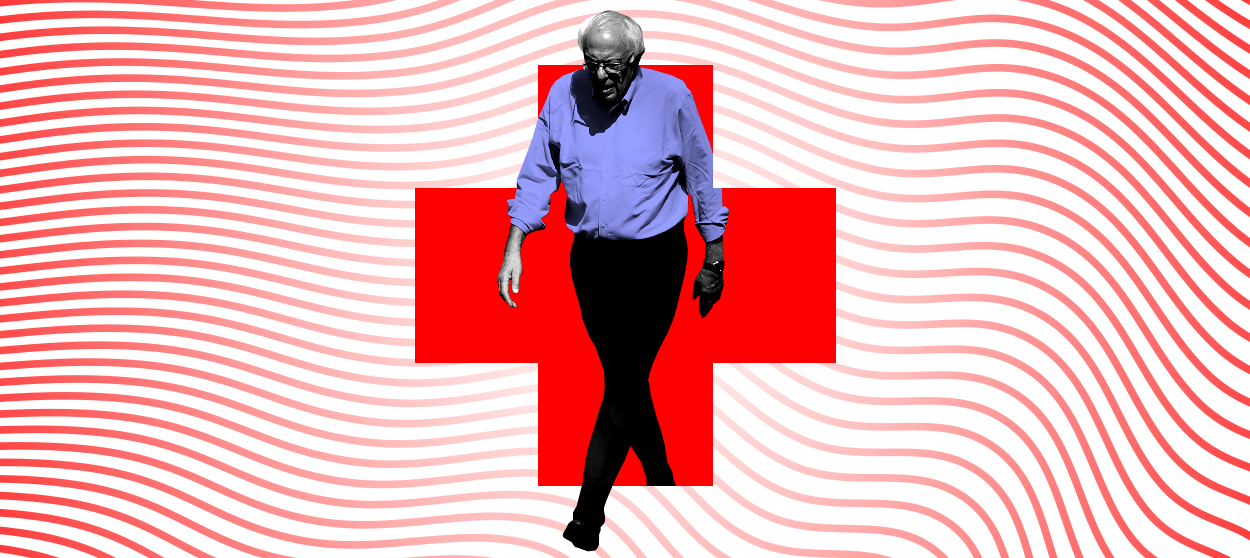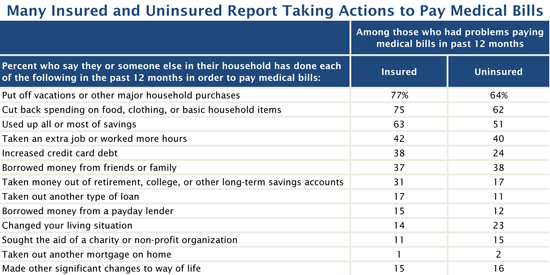Is Bernie Sanders right about medical bankruptcies?
Better yet, who cares?


A free daily email with the biggest news stories of the day – and the best features from TheWeek.com
You are now subscribed
Your newsletter sign-up was successful
How many bankruptcies are caused by America's dysfunctional health-care system? Bernie Sanders has been at the center of a days-long controversy over this question. He said 500,000 people are bankrupted annually by medical debt, citing an American Journal of Public Health study which actually found 530,000 bankruptcies every year caused in some way by medical bills (or about 65 percent of the total). Washington Post fact-checker Salvador Rizzo attacked, awarding him 3 out of 4 "Pinnochios" for failing to cite a completely different study — though in what is becoming a sadly typical pattern for the genre, Rizzo himself made a serious factual error in the process, describing the AJPH paper as not peer-reviewed when in fact it was.
As funny as it is to watch so-called fact checkers beclown themselves in their palpable eagerness to expose the radical commie candidate, the specifics of this debate shouldn't lead us to miss the bleeding obvious. Whatever the accurate number is, we can be sure beyond question that medical debt is causing a great ocean of pointless misery — and Medicare-for-All would help a lot.
But first, let's consider the glib contrarian case that actually, medical bankruptcy is a "myth." For that we turn to Megan McArdle, noted expert on war spending, recession timing, 1950s appliances, school shooting defense tactics, and fire-resistant apartment building exteriors. In a 2018 Washington Post article, she pointed to a New England Journal of Medicine study which found a dramatically smaller result for hospital medical-debt induced bankruptcies — just 4 percent of bankruptcies, or about 31,000 per year.
The Week
Escape your echo chamber. Get the facts behind the news, plus analysis from multiple perspectives.

Sign up for The Week's Free Newsletters
From our morning news briefing to a weekly Good News Newsletter, get the best of The Week delivered directly to your inbox.
From our morning news briefing to a weekly Good News Newsletter, get the best of The Week delivered directly to your inbox.
As an initial matter, McArdle archly declaims that this study's methodology is "considerably more robust" than previous studies (one co-authored by Elizabeth Warren, incidentally) finding a much higher result. But this is highly contestable. For one thing, the authors restricted their sample to only California residents aged 25-64 who had visited a hospital for a non-pregnancy related reason. They exclude children, the elderly, and debt resulting from medical problems that don't land people in the hospital. "[T]hese results do not cover all potential medical bankruptcies," they write. And while they argue their methodology "probably" doesn't result in a vast underestimate, a super-robust study should examine the whole population directly if at all possible.
More generally, McArdle's chosen study takes a pinched view of causation. Their sample is restricted in that way so they can try to examine what proportion of bankruptcies can be directly pinned on a hospital visit — in which a person goes to the doctor, and some time later files for bankruptcy solely because of that visit. And for that narrow purpose it is well done (though strictly speaking it is impossible to establish certain causality for any bankruptcy, because there is an infinite universe of possible events any one of which would have prevented it from happening).
Still, this leaves out a lot of scenarios in which a bankruptcy would not have happened without medical debt, even if it was not the direct precipitating factor. If someone has a big load of medical bills but is still making the payments, for instance, only to crash their car and be pushed into bankruptcy from the repair cost, medical debt is still causally related even if it isn't the most immediate cause. (In the philosophy of causation, this is the difference between proximate and distal causes.)
Even fairly conservative scholars generally agree that adverse events like divorce, medical debt, or business failure are major driving factors behind bankruptcy declarations. That is why the study co-authored by Warren just sent out surveys to people who had declared bankruptcy and asked them if medical debt was related in some way. That methodology has its own problems (for one thing, people may misremember their finances), but it captures a broader and arguably more accurate universe of causes.
A free daily email with the biggest news stories of the day – and the best features from TheWeek.com
What's more, studies aside from these two have also found far larger numbers. A clever 2011 Journal of Public Economics study used natural experiments in the form of state-level Medicaid expansions, and found about 26 percent of bankruptcies were caused by medical debt. A 2014 article in the Maine Law Review estimated that medical debt was the "predominant" causal factor in 18-26 percent of bankruptcies.
But perhaps the most sensible perspective of all can be found by reading a Kaiser Family Foundation/New York Times survey, which found tens of millions of people bearing a terrible burden of medical debt. Some 20 percent of insured Americans aged 18-64 report struggling to pay medical bills — and 53 percent of uninsured. Among that struggling population, huge fractions report serious financial distress, like the 63 percent of struggling insured people who burned through most or all of their savings:

One of the reasons Bernie Sanders advocates for Medicare-for-All is because lots and lots of Americans are being financially broken on the wheel of medical debt — and a great many more are suffering short of bankruptcy. It is absolutely inarguable that this is happening. This vast sea of pain is simply what happens when a country pushes more and more and more of the financing of its health care system onto individuals who cannot bear the load.
Whether the actual number of people annually driven into bankruptcy by America's wretched jalopy health care system is 530,000 or "only" 31,000, the number is way too big. If we implemented the Sanders plan — which would cover all medical, dental, vision, nursing, and prescription drugs, with only a small co-pay for pharmaceuticals — we could get rid of most of this suffering at a stroke. (Adding a universal sick leave plan as all our wealthy peer nations have to cover loss of income caused by missing work would make things better still, but that's a subject for another day.)
There will always be tendentious libertarian ideologues sprouting up to nitpick anyone suggesting that we could all live better lives by jacking up taxes on the rich to fund social benefits. Don't let them distract you — Medicare-for-All done properly would massively improve the lives of almost every American.
Ryan Cooper is a national correspondent at TheWeek.com. His work has appeared in the Washington Monthly, The New Republic, and the Washington Post.
-
 The Olympic timekeepers keeping the Games on track
The Olympic timekeepers keeping the Games on trackUnder the Radar Swiss watchmaking giant Omega has been at the finish line of every Olympic Games for nearly 100 years
-
 Will increasing tensions with Iran boil over into war?
Will increasing tensions with Iran boil over into war?Today’s Big Question President Donald Trump has recently been threatening the country
-
 Corruption: The spy sheikh and the president
Corruption: The spy sheikh and the presidentFeature Trump is at the center of another scandal
-
 The billionaires’ wealth tax: a catastrophe for California?
The billionaires’ wealth tax: a catastrophe for California?Talking Point Peter Thiel and Larry Page preparing to change state residency
-
 Bari Weiss’ ‘60 Minutes’ scandal is about more than one report
Bari Weiss’ ‘60 Minutes’ scandal is about more than one reportIN THE SPOTLIGHT By blocking an approved segment on a controversial prison holding US deportees in El Salvador, the editor-in-chief of CBS News has become the main story
-
 Has Zohran Mamdani shown the Democrats how to win again?
Has Zohran Mamdani shown the Democrats how to win again?Today’s Big Question New York City mayoral election touted as victory for left-wing populists but moderate centrist wins elsewhere present more complex path for Democratic Party
-
 Millions turn out for anti-Trump ‘No Kings’ rallies
Millions turn out for anti-Trump ‘No Kings’ ralliesSpeed Read An estimated 7 million people participated, 2 million more than at the first ‘No Kings’ protest in June
-
 Ghislaine Maxwell: angling for a Trump pardon
Ghislaine Maxwell: angling for a Trump pardonTalking Point Convicted sex trafficker's testimony could shed new light on president's links to Jeffrey Epstein
-
 The last words and final moments of 40 presidents
The last words and final moments of 40 presidentsThe Explainer Some are eloquent quotes worthy of the holders of the highest office in the nation, and others... aren't
-
 The JFK files: the truth at last?
The JFK files: the truth at last?In The Spotlight More than 64,000 previously classified documents relating the 1963 assassination of John F. Kennedy have been released by the Trump administration
-
 'Seriously, not literally': how should the world take Donald Trump?
'Seriously, not literally': how should the world take Donald Trump?Today's big question White House rhetoric and reality look likely to become increasingly blurred
